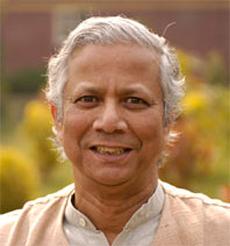Bangladeshi banker Muhammad Yunus may not exactly fit the criteria of a cape-wearing superhero, but his intentions are similar-helping those less fortunate.
You could say that a big heart and $27 led Yunus to a winning a Nobel Peace Prize.
Yunus’ road to success started with his first loan back in 1976 to a group of 42 women from a village in Bangladesh. He gave the women about the equivalent of $27 and freed them from their debts to local moneylenders who charged high interest rates.
Why were these women forced to rely on these predatory loan sharks who practically enslaved them? Think about it for a moment-what kind of conventional bank would lend money to someone so poor, they can’t guarantee repayment? And how would the banks profit from lending such small amounts of money?
Since many of the poor depend on such loans for their livelihood, this has been a problem in many areas of the country. From this dilemma came Yunus’ idea of micro-credit-lending money to those shunned by typical banks. When I say loans, I mean small amounts of money that you would think trivial-like five dollars. You would think that this money couldn’t possibly do anything, but it gives the recipients a chance to make profits and actually live a better life.
In 1976, Yunus founded the Grameen Bank to make such loans on a much wider scale.
Over the next 30 years, chains of banks similar to Grameen were established in many countries all over the world.
The way his banks work is very intriguing and surprisingly successful. Small groups sign up for loans together and everyone takes responsibility in making sure that it is repaid.
The fact that repayment rate is 98 percent proves that this has been a successful venture.
Yunus’ banking system idea has been estimated to have extended credit to more that seven million of the world’s poor. Approximately 96 percent of Grameen’s loans have gone to women.
His brilliant idea of micro-credit is also being used here in the United States. Hillary Clinton said that in 2000, Yunus had helped her and her husband, Bill Clinton, introduce micro-credit initiatives to some of the poorest communities in Arkansas.
Superman? Nah. He’s just an ordinary guy who turned an idea created from good intentions into an international movement that is benefiting millions.
Yunus and the Grameen Bank were jointly given this year’s Nobel Peace Prize.
“Lasting peace cannot be achieved unless large population groups find ways in which to break out of poverty,” stated the Nobel committee in awarding the prize. “Micro-credit is one such means.”
It’s comforting to know that there are people out there who aren’t consumed with the things that go on in their convenient and isolated bubble of a life.
Yunus deserves public respect for doing what he has and is doing- giving opportunities to those less fortunate and presenting them with a means to make their lives of dismal poverty a thing of the past.
The proverbial icing on the cake is definitely the fact that Yunus donated all of his $1.4 million in prize money to various charities.

